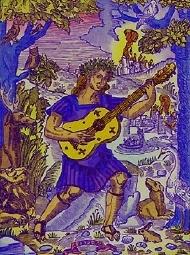 |
| Orpheus as Folk-Rock Musician |
|
| Re-Vision Radio's Musekal PhiloSophy
"Philosophy In a New Key"
|
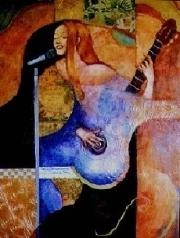 |
| Joni's "Chords of Inquiry" |
|
|
|
| This page is meant to give my Re-Vision Radio listeners a conceptual-visual aid for better understanding my central program theme of Musekal Philosophy,
which means that philosophical texts or essays aspire to the condition
of music or song--the condition of music translated into words. In
general, this web-page provides a kind of conceptual map-theory for
guiding listeners to find the musical key to unlock the meaning of the Tower of Song program. It is hoped that this page will lay bare the the vision of "scholarship as performance art" and show the naked truth behind my novel hybrid of Musekal PhiloSophy. |
|
 |
| "El Maestro Orpheus" (Renaissance woodcut) |
|
|
|
| Did Ye Get Healed | I wanna know did you get the feelin'?
Did you get it down in your soul?
I wanna know did you get the feelin'?
And did the feelin' grow?
Sometimes, when the spirit moves me
I can do many wondrous things
I wanna know when the spirit moves you
Did ye get healed?
I begin to realise
It manifest in my life
In oh, so many ways
Every day I wanna talk about it
And walk about it
Everyday I wanna be closer
I wanna know did you get the feelin'?
Did you get it down in your soul?
I wanna know did you get the feelin'?
And did the feelin' grow and grow
Did ye get healed?
I begin to realise
Magic in my life
See it manifest in oh, so many ways
Every day is gettin' better and better
I wanna be daily walking closer
It gets stronger when you get the feelin'
When you get it down in your soul
And it makes you feel good
And it makes you feel whole
When the spirit moves you
And it fills you through and through
Every morning and at the break of day
Did ye get healed?
(Van Morrison, 'Did Ye Get Healed') |
Re-Vision Radio broadcasts a Musekal Philosophy from the TOWER OF SONG
"It
has been said that the Troubadours [of the Twelfth-century Renaissance]
are responsible for modern poetry. It is, however, mostly to their
songs . . . that the troubadours owe their survival into the twentieth
century. They envisioned love as inspiration to song."
Folk-rock
and rock musicians served as singing prophets for the generation of the
Sixties. Orpheusbard, prophet, rhetorician, and musician ("singer of
love-songs)is the archetype for musicians of the Sixties, who joined
the prophetic ranks of the new singer songwriter, and created the music
that defined the whole idea of the confessional songwriter, with his or
her introspective style: "the sound of an introverted, troubled
dreamer, with this sort of tremulous angelic voice."
"Let us bring to bear the persuasive powers of sweet-tongued Rhetoric
and . . . let us have as well Music, the maid-servant of my house, to
sing us melodies of varying mood."
(Boethius, The Consolation of Philosophy)
"How charming is divine Philosophy
not harsh and crabbed as dull fools suppose
But musical as is Apollo's lute."
(Coleridge) |
See me through days of wine and roses
By and by when the morning comes
Jazz and blues and folk, poetry and jazz
Voice and music, music and no music
Silence and then voice
Music and writing, words
Memories, memories way back ...
Take me way back ....
(Van Morrison) |
|
|
Re-Vision Radio's Orphic Essay-with-Soundtrack demonstrates
"a
schizoid polycentricity, a style of consciousness that thrives in
plural meanings, in cryptic double-talk, in escaping definitions."
And thus Re-Vision Radio's Orphic Essay-with-Soundtrack mixes PhiloSophy & Music--a
harmonious interplay of dialectics/argument and song, prose composition
and metrical composition; a concourse of prose discourse and lyrical
outpouring that issues in a songful Radio-text of ideas & love.
"Behind
the lyric and the song is the governing, central idea, and you have to
keep both of them going, so neither gets bogged down. The trick is to
keep them going together.
(Stephen Soundheim) |
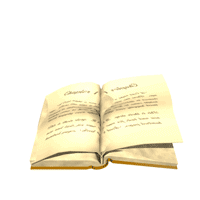 |
| Orphic Essay-with-Soundtrack |
|
|
|
RE-VISION RADIO's
Music Magic & the "Music of the Spheres"
in the TOWER OF SONG |
|
|
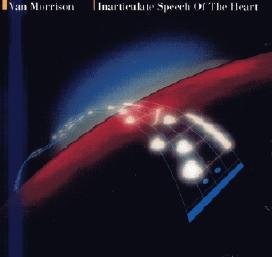 |
| Van's "Music of the Spheres" |
|
|
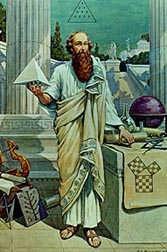 |
| Pythagoras, "Music of the Spheres": Philosophy & Music |
|
|
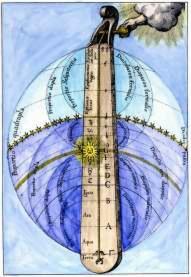 |
| Pythagoras' "Cosmic Scale" |
|
|
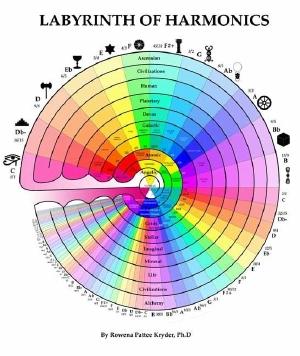 |
| Planetary Harmonics |
|
|
 |
| Fractal Music of the Spheres |
|
|
RE-VISION RADIO's Quest for (Renaissance) Music Magic:
"Did Ye Get Healed?"
Revision Radio quests, through Orpheus' musical magic, for The Tower of Song, by following the aboriginal "songlines" of the planet (i.e., world music) in order to enter into the soul of the "Unending Song" (i.e., the "Music of the Spheres"). In Revision Radio's "Musekal Philosophy," entering (with the astral body) into the song is a metaphor for emerging into the Tower of Song. Once "there" (inside the music), the listener-quester will "see what I mean" by the Tower of Song! "Did Ye Get Healed"?
|
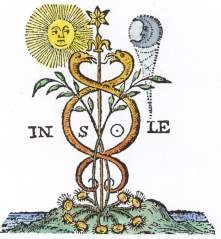 |
| Alchemical Caduses |
|
|
Those who are affected by music can be divided
into two classes: those who hear the spiritual meaning, and those who
hear only the material sound. However, there's a third class of people
affected by music: those listening to the Tower of Song hear the material sound, hear the spiritual meaning, and see the psychic image. In other words, they imaginally see what it means.
This
visionary effect of music is the beginning of Renaissance occult,
magical science of music based upon Pythagoras and Orpheus, which
Marsilio Ficino and Robert Fludd practiced. Central to this occult
music magic was the concept of "soul," since it was this that music
effected. |
|
The Music Magic of the Renaissance
It has no less a power than anything else that goes into the one who is singing. From him this power goes to the nearest listener, to the extent that the song keeps its vigor and keeps the spirit of the one singing, especially if this singer himself has a Phoebean nature, a strong vital spirit of the heart, and a stong animal spirit
. The seminal spirit generates beyond itself an offspring, so the vital and animal power, where it is most effective, makes the most intense sort of things through the song of its spirit. It works powerfully, with conception and agitation, on the nearest body; then, spilling over, it moves the next body, and when it has affected its own, it then affects someone else with a certain property. It conceives this from its own form and from selecting the right time. Masilio Ficino
Music in Renaissance magic was the art of producing a desired effect or result on the soul through the use of various techniques, like incantation, that presumably assure human control of supernatural agencies or the forces of nature. Music magic is essentially the art of combining and regulating sounds of varying pitch to produce compositions expressive of various ideas or emotions. This music art of magic that was designed to effect the soul was based upon a system of occult correspondences between certain chords, planets, and the individual's temperament or "humours."
The connections of these two arts persist in our common usage as well. We still hear talk of "the magic of music," a phrase that evokes the emotions music mysteriously but powerfully arouses. The lexicon of magic has loaned one of its specifically musical terms to our vocabulary of emotional delight: from incantare or incantatio, the musical technique taken the dictionary to be exemplary of all magical operations--"enchanting," "enchanted," and related words. And from the most common Latin term for a song or tune, we derive a ubiquitous English word that still retains magical implications in some of its meanings, "charm." On a less commonplace level music and magic are linked in the etymologies of their names themselves. Both derive from ancient mythical or semimythical figures, from the Muses of ancient Greece and the Zoroastrian priest/shaman of the ancient Middle East, the Old Persian magush, sorcerer. Both words referred originally to the arts of these personages and carry still the resonance of their authoritative, all-embracing knowledge: the nine arts represented by the Muses, daughters of Memory (Mnemosyne) herself; and the high priest/sorcerer of all-but-forgotten mystery religions.
This resonance is by now weak in the case of music, of course. The history of this term's use has been one of delimitation. Though derived from words that once denoted the totality of the Muses' arts, the universal knowledge of techne, music has in modern times come to denote a much more restricted range of craft. The variety of arts denoted by magic, on the other hand, has always remained broad, notwithstanding local redefinitions and circumscriptions in particular historical situations. In the history of these two usages the European sixteenth century was a pivotal time. It was the last moment in central currents of European culture when the term music could allude to a form of universal knowledge, when musical thought could aspire to embrace or at least touch all human conceptions and fashionings. But it also witnessed an efflorescence in magic, a transitory broadening of the always significant range of the occult arts that allowed the word in some usages to connote a universal philosophy. The stage attained in the sixteenth century by each of these branches of thought along the arc of its internal development--the still-persisting breadth of the one, the momentary comprehensiveness of the other--allowed for novel and rich interactions between them.
Music, therefore, begins to look like a method of magic. If this is true, then this is an old connection, since it all goes back to Orpheus, the musician/magician.
Re-Vision Radio's Orphic Essay-with-Soundtrack, in mixing Philosophy & Music --dialectics/argument and song--, also broadcasts a confluence of the ancient "Infinite Conversation" & "Unending Song." Again, this goes back to the legendary Orpheus, whose favorite pursuits were rhetoric and music--Orpheus, "singer of love songs." |
|
|
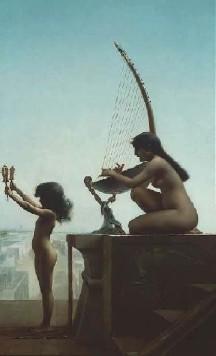 |
| "Mystical Blessings" of Music |
|
|
The enchanted atmosphere of musical magic on Re-Vision Radio takes you back way, way backto the long-ago-and-far-away Romantic atmosphere of the Orphic Temple of Music, where the Renaissance idea of Magic & Music (through Hermetic-Neoplatonic philosophy) is etched in stone. Inspired by the divine visitation of the Muses, Pythagorean magic and Neoplatonic poetic furor combine to evoke various heightened ideas and emotions. This definitive poetic furoralso referred to as frenzy and rapturewas believed to manifest in poems & songs:
Whoever is possessed in any way by a deity indeed overflows on account of the vehemence of the divine impulse and the fullness of its power: he raves, exults . . . therefore this possession is called furor .... No one under the influence of furor is content with simple speech: he bursts forth into clamoring and songs and poems.
Furthermore, the highest reaches of poetic flightinspired music and poetry associated particularly with poetic furorwere attained by the soul in the throes of Venus's amatory or erotic furor, which suggests an infused, over-flowing soul rather than an absent, disembodied state. And because the occult power of the spoken word & music was taken for grantedas poetic magic, this phenomenon of musico-poetic furor was seen by Neoplatonic occultists, like Marsilio Ficino, as evidence of the presence of numinous forces.
In the light of Ficinos suggestions, the marvelous psychological effects of music described by writers of Antiquity now take on a new meaning: they are not records so much of music as of ceremonial magic, of precisely the kind Ficino was trying to revive.
The correspondence of word, image, music, soul, and the planets suggested an imagistic conception of words & music that united in song intellectual content & sound, as perceived by soul. Yet, this Italian Renaissance conception of musical magic (word, image, and music) most probably has its beginnings in an earlier period, also known as a cultural rebirththe Twelfth-Century Renaissance of the Troubadours, who also venerated Orpheus. Here, too, music was seen as having magical powers. Throughout the Middle Ages, the pitches used in western music were consistently linked with the Pythagorian musical spheres of the universe. The spheres, in turn, were intimately bound up in astrology, a cornerstone of medieval magic. (The tradition goes back as early as Pythagoras and Plato.) The connections between singing and Troubadour story-telling is emphasized in the root for song; cant. This root takes on considerable significance when we realize that the word for magic in certain romances is encantement (en-cant-ment, literally ensongment). Thus, we have the link between singing, story-telling performers, and magic. This link seems to have been taken up again and perfected by the Renaissance occultists, who believed in the power of words and song for moving the soul and gaining celestial benefits and climbing the Platonic stairway to heaven. Once concretized in the Renaissance Temple of Music, these celestial raptures can today be gained by climbing high up in the TOWER OF SONG. So RE-VISION RADIO, going backway, way backwould use its Orphic, magical, and amatory, Song-formthe Essay-with-Soundtrackto get down to the roots of Medieval Troubadour and Renaissance Magical Music traditions in order to reveal their revival and continuation in the popular music of the Sixties. Thus Everybody Knows: The powerful pulsing of love in the vein .... / These are the roots of rhythm / and the roots of rhythm remain. And every time you hear the Orphic medley or philosophical acoustics of RE-VISION RADIOS Essay-with-Soundtrack you hear something new and novel, because it's full of those hidden or Hermetic correspondences, resonances, and connexions. However, listening to its Orphic melodic rhythm isn't just about the words or just about the music but, as in Renaissance music magic, its about how their synergy moves your soul. Thus, RE-VISION RADIOs version of Magic Song, because of its synaesthetic mix of sound & imageradio-graphics, has musically-determined meanings that evoke an occult Musekal Philosophy through the ceremonial magic of hosting RE-VISION RADIO. And because RE-VISION RADIO expresses its esoteric Philosophy best in magical Song (Thats why Im telling you in song Van Morrison), it hopes that its listeners would ask: What I want to know is: how does the song go? (Grateful Dead) And, Everybody Knows, it goes, ultimately, to the TOWER OF SONG.
The Renaissance Philosophy of Music and Magic becomes, on RE-VISION RADIO, the music of philosophy through its Orphic Essay-with-Soundtrack, since, according to the occult philosopher, Agrippa, the right words when joined to the right music fill the listener with heavenly energies: Besides the virtues of words and names, there is also a greater virtue found in sentences, from the truth contained in them, which hath a very great power of impressing, changing, binding, and establishing, so that being used it doth shine the more, and . . . of which sort are verses, enchantments, imprecations, deprecations, orations, invocations, obstestations, adjurations, conjurations, and such like. . . . They that desire further examples of these, let them search into the hymns of Orpheus, than which nothing is more efficacious in Natural Magic . . . . [which will] confer a very great power in the enchanter, and sometimes transfer it upon the thing enchanted, to bind and direct it to the same purpose for which the affections and speeches of the enchanter are intended. (Of many Words joined together, as in Sentences and Verses; and of the Virtues and Astrictions of Charms) However esoteric and transcendental this magical power may sound to the average person, it should be noted that it is fundamentally a natural magic of human expression: For we are not now speaking of worshipping divinities but of a natural power in speech, song, and words. (Ficino) This is, then, the only claim that RE-VISION RADIOs makes: to exercise the natural magic of the blend of words and music. So, whether it is this magical theory of Agrippa, or Ficinos notion of the power of words and [planetary] song for capturing celestial benefits, or Robert Fludds notion of the occult and wondrous effects of the secret Music, RE-VISION RADIOs magic of Musekal Philosophy is to rediscover the Renaissance Temple of Music in the TOWER OF SONG.
Because the esoteric Renaissance Philosophy of Music is inseparable from Ficinos Neoplatonic concept of soul (Music and the souls longing; Other melodies and rhythms have the power of transporting the soul from one state to another; the soul awakened by music; the souls ascent through music; music as an occult numeration of the soul), RE-VISION RADIOs enchanting mix of words and music is its own special kind of soul-music; a soul-manifesting music.
So the magical musicology of RE-VISION RADIOs Orphic Essay-with-Soundtrack, with liquid measures flowing, creates a hypnotic atmosphere, or shamanic trance-state of mind; an intellectual mood-piece for radio that strikes a mystic chorda deep, soulful chord: Music that can deepest reach (Emerson). So Everybody Knows that the deepest reach of RE-VISION RADIOs music is for the perfect union of words and musicthe radio-quest or night-journey that is also a search for the Unending Melody. For Everybody Knows, also, that this quest goes backway, way backto Ancient Greece; to the Pythagorean view of music as a microcosman esoteric system of sound & rhythm ruled by the same mathematical laws that operate in the macrocosm of visible creation: Music, in this view, was not a passive image of the orderly system of the universe; it was also a force that could effect the universehence the attribution of miracles to the legendary musicians of mythology. And, thus, Everybody Knows RE-VISION RADIOs Orpheushence the ancient magical connotations and extensions of music come to be understood as the power in music akin to the power of words for influencing human thought & action.
So Everybody Knows, too, that the power of music is a mysterious power we don't fully understand; a magical power for reflection and creative exploration. Because RE-VISION RADIOs believes with Emerson that the manner of using language is surely the most decisive test of intellectual power, it would ask in unison with the American Plotinus: Who does not feel in him budding the powers of a Persuasion that by and by will be irresistible? And Everybody Knows that these magical budding powers of Persuasion are maximized in the TOWER OF SONG.
|
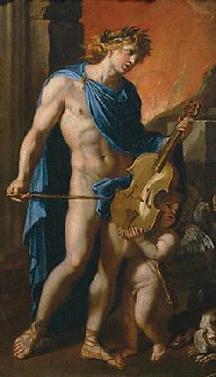 |
| Orpheus |
|
|
|
RE-VISION RADIO'S
Romantic Quest in Archaic Revival of
Musekal Philosophy |
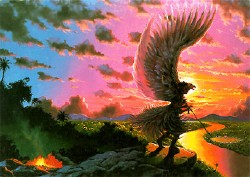 |
| Shamanic Flight |
|
|
| Take Me Back | RE-VISION RADIO Takes You Back
--"Way, Way Back"--in Archaic Revival
to the origins of Western Philosophy with Parmenides, Empedocles, and Pythagoras, when "philosophy" was poetry--was a visionary/mystic discipline, with ascent journeys to the stars (Parmenides). In other words, "way, way back" to the shamanic origins of Western "philosophy." From there, it goes back to Socrates and Plato (introducing the concept of "soul," or "psyche") when, after carving a separate role for "philosophy" (dialectic), a synthesis of philosophy's new logos with old poetry's mythos was attempted--especially with music. But most of all, Re-Vision Radio takes you back--"way, way back"--to great Orpheus, who symbolizes the original and perfect union of Philosophy & Music.
And the music on the radio,
and the music on the radio
Has so much soul, has so much soul
And you listen, in the nightime
While we're still and quiet. . .
|
"Let us bring to bear the persuasive powers of
sweet-tongued Rhetoric and . . . let us have as well Music, the
maid-servant of my house, to sing us melodies of varying mood." (Boethius, Consolation of Philosophy)
"This
introduction is the key which shall open to you the flowers of the
discourse that is to follow, namely, the investigation of the arts, of
wisdom, of reason and understanding, the efficacious methods and
revelations which throw light upon the secret words. (From the alchemical text, The Visions of Zosimos)"
"The
way to speak and write what shall not go out of fashion is to speak and
write sincerely. He that writes to himself writes to an eternal public.
That statement only is fit to be made public which you have come at
attempting to satisfy your own curiosity." (Emerson, Spiritual Laws)
"This
spiritual love acts not, nor can exist / Without Imagination, which in
truth / Is but another name for absolute power / And clearest insight,
amplitude of mind / And Reason in its most exalted mood." (Emerson)
Re-Vision Radio would go back to the "light of Ancient Greece /Towards the One" (V.M.), it broadcasts its "Archaic Revival" of great Orpheus--rhetorican and "singer of love songs." Yes, "way, way back" to the shamanic orgins of Western culture, when "religion" (e.g., "the Orphic Mysteries") was understood as a tradition of shamanic ecstasy. Thus, looking back to the cult of the Muses and Plato, who encorporated the Orphic Mystery cult into the new dialectical tradition, Re-Vision Radio reunites Philosophy & Music, and, thus, puts its Philosophy best in song.
"That's why I'm telling you in Song." --Van Morrison
And that "PhiloSophy" is essentially a "Soul-making" (Keats) discipline, since "give attention to soul""erotic metaphysics" (a commingling of "love and ideas"), because of Socrates' and Plato's emphasis on eros (erotic mania) as the driving force of the philosopher's (the "lover of wisdom") quest--"a simultaneous knowing and loving by means of imagining. Thus, the kind of practically defines the entire philosophy of Socrates and Plato. It is also an PhiloSophy heard on Re-Vision Radio is a union of knowing and desire: "You can call my love Sophia / I call my love Philosophy." (V.M.) This is why the Gypsy Scholar re-visions "PhiloSophy" as a great Western Quest-Romance:
"[Lovers
of Wisdom] believe that it is wrong to oppose PhiloSophy with her offer
of liberation and purification, so they turn and follow her wherever
she leads." (Socrates, Phaedo ) |
|
Argument mixed with music . . . alone, when it is present, dwells within one possessing it as a savior of virtue throughout life.
(Socrates, Republic)
Thus much of music, which makes a fair ending; for what should be the end of music if not the love of beauty?
(Socrates, Republic)
The soul which has seen most truth shall come to birth as a philosopher, or beauty lover, or fervent musician.
(Socrates, Phaedrus)
Philosophy, which has always been the pursuit of my life, and is the noblest and best [highest] of music.
(Socrates, Phaedo)
. . . don’t we know that all of this is a prelude to the song itself, . . . the song itself that dialectic performs?
(Socrates, Republic)
[These Platonic insights into the secret connection between philosophy and music--due in part to the etymological meanings of the Greek word for "muses" (mosthai), which embraces both "music" and "inquiry"--were found long after I began experimentally mixing dialectics with music, which included extended spoken-word "lead-ins" to popular songs, on my radio program, beginning in 1990.]
|
 |
| School of Plato |
|
|
Therefore, since "Eros redefines reason in its own terms," Re-Vison Radio's Orphic Essay-with-Soundtrack, mixing PhiloSophy & Song, or dialectics and music, replaces the "murders to dissect" (Wordsworth) mode of academic (Protestant) scholarship with service to Eros--insight, synthesis, celebration; "Reason in its most exalted mood."
And, thus, your Re-Vision Radio host, the Gypsy Scholar & Bohemian Essayist --in the role of the scholar as artist of Eros and longing to connect with that soulful dark blue-fire rhythm of things--romantically burns the candle at both ends: logos & mythos, ideas and love, reason
& imagination, fact & fantasy, realism & idealism,
dialectical & mystical, mind & heart--the end of the Argument & the Song on your radio dial, tuned to the Romantic Tower of Song.
And in the Tower of Song, those "funny voices" from "way, way back" can he heard: "Love that discourses in my mind" (Pugatorio, Canto II). Practicing its own form of the twelfth-century Troubadour "Dialectic of Love," the Gypsy Scholar would use his Orphic Essay-with-Soundtrack to discourse on love and philosophy, love and ideas--the philosophy of love and the love of philosophy ("wisdom"). Indeed, in the Tower of Song (listening to Socrates and Plato) these two are so intertwined that one can't tell if the philosophers are singing about the virtues of love or, conversely, if the lovers are decanting on the pleasures of philosophy. Ergo, in the Tower of Song one can find following equation etched in the wall: PhiloSophy = Music = Love ("Oh, Socrates and Plato / They praised it [love] to the sky." --Van Morrison. Re-Vision Radio's "flowers of discourse" (the Essay-with-Soundtrack), plays both aspects of the psyche: both
reason and inagination, scholarly/critical intellect and
intuitive/artistic heart, academic research and mystical insearch; both
secular hermeneutics and sacred hermetic/kabbalistic interpretation,
both scholarly rigor and poetic reverie, Apollonian clarity and
Dionysian obscurity, philosophical questioning and romantic questing;
both philosophical aptitude with musical amplitude. This results in the paradoxical reuniting of the Western head and heart-a Romantic comingling of a "sensuous reason" and a "feeling intellect," thereby synthesizing the left and right brain:
"If my heart could do my thinking / And my head begin to feel / I would
look upon the world anew / And know what's truly real." (Van Morrison)
Running the popular song through the engine of dialectic not only
re-visions the song philosophically, but returns the dialectic to its
original Orphic/Pythagorean/Platonic music--making philosophy musical. In other words, Platonic dialectic becomes oracular poetry/song after it has risen, with an incredible impulse, through the mania [madness] of Eros to the heights of philosophy." And the "heights of philosophy" are expressed on Re-Vsion Radio as the "flowers of discourse."
Therefore, tied by those "twenty-seven angels" to the writing table in the Tower of Song, the Gypsy Scholar & Bohemian Essayist re-visions PhiloSophy leading, finally, not to ponderous academic desiccation but to ecstatic Dionysian celebration--a sort of mind-jazz ensemble. |
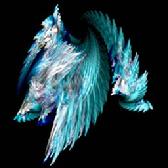 |
| "And twenty-seven angels/From the Great Beyond/They tied me to this table/In the Tower of Song" |
|
|
 |
| "Notes Towards A Musekal Philosophy" |
|
|
 |
| writing table in the Tower of Song |
|
|
 |
| "flowers of discourse" |
|
|
| Hymns To The Silence | ... Oh my dear, oh my dear sweet love it's a long, long journey
Long, long journey, journey back home
Back home to you, feel you by my side
Long journey, journey, journey
Yeah in the midnight, in the midnight, I burn the candle
Burn the candle at both ends, burn the candle at both ends
Burn the candle at both ends, burn the candle at both ends
And I keep on, `cause I can't sleep at night
Until the daylight comes through
And I just, and I just, have to sing ...
(Van Morrison, 'Hymns To The Silence')
|
 |
| Orpheus |
|
|
RE-VISION RADIO Presents MUSEKAL PHILOSOPHY |
 |
| scholar |
|
|
 |
| + artist |
|
|
 |
| + musician |
|
|
Musekal Philosophy: Playing Philosophy, Playing Music
Re-Vision Radio's quest has taken it back--way, way back to "the light of ancient Greece / Towards the One" (the Neoplatonics the One). Sitting at that ancient banquet table in the Tower of Song, I learned from Socrates and Plato to reunite Philosophy & Music into a single discipline, an ecstatic discipline--originally, "of the Muses"--in service to Eros. Thus, because for Plato Philosophy was a dialectical art form--a form of play--, on Re-Vision Radio playing music is actually playing with Philosophy. (The Muses have the "gift of speculative knowledge" and "unregrettable play," "measured and reasonable play." Mousikos: "of the Muses, devotion to the Muses, musical; musician; lyric poet; scholar, man of letters." Mousie, ta mousike: "art of the Muses; music, song, poetry, dancing, arts, letters, accomplishments"). "We have sought truth, and sometimes found it. But have we had any fun?" Benjamin Jowlett, translator of Platonic dialogues). Therefore, the Western "ancient quarrel" (agon) between mythos and logos will be resolved when poetry/music and philosophy are recognized as two aspects of one art form.
And because, as Hesiod tells us, the Muses are "of one mind,"
poetry/music and philosophy are not out of tune with each other. This
single-mindedness unites the different nine Muses into "one harmonious
chorus." (The name of the Muses and of music are derived from their
making "philosophical inquiries." Furthermore, these Muses have, writes
Plato, "the gift of speculative knowledge" and are "of one mind,"
desiring to "express themselves in song." Plato also suggests that "the
Muses and music in general are named, apparently, from mosthai,
"searching," and "philosophy"--"to strive after," "to long for," or "to
desire eagerly"--, and partakes of similar meanings as does philosophia; "loving," "searching," "striving," and "inquiry.") My own definition of musicology's "speculative music" succinctly designates the grand union of philosophical inquiry and musicality. In broadcasting what I call Musekal Philosophy, via my Orphic Essay-with-Soundtrack, I strive to give listeners what in the history of Rock n Roll is described as "lyrics that make one think." This is the great legacy of the Sixties folk-rock musicians, our modern Trobadours. "I understand my music as chords of inquiry" (Joni Mitchell). My novel notion that Philosophy & Music are one-and-the-same "art" is found in Socrates original con-fusion, brought about by his dream that admonished him to "Make and cultivate music!" Hence, Socrates reflects that "the study of Philosophy, which has always been the pursuit of my life, is the noblest and best [highest] form of music." I only compound Socrates con-fusion, in regarding, conversely, Music as the highest form of Philosophy. In my Musekal PhiloSophy, then, the philosopher and the poet are in complete harmony, since Socrates the daimon/muse,"music art." Diotima, demanded of Socrates a
On Re-Vision Radio, this reunion and fusion of Philosophy & Music--dialectics/argument and song; logos and mythos--makes for a philosophy that is musical and, conversely, a music that is philosophical. Thus, Everybody Knows the Orphic Essay-with-Soundtrack's musekal philosophy is also the (Romantic) "philosophy of music."
(The Romantic's belief that music is the highest art; the pure
expression of feeling and thus supra-rational, and the end of
philosophy is music.) In addition, Musekal Philosophy makes the ideal philosopher (according to Socrates and Plato) a "fervent musician," or a "musical man. Moreover, because PhiloSophy is a form of play--an artistic endeavor--, it makes the scholar of philosophy a scholar-artist-musician, who is distinguished by his or her ability to play with knowledge and create a collage of ideas or intellectual mind-jazz.
"....
Here's to the was you been, to the is you in, to what's deep in deep
and what's down and down / to the lost and the blind, and the almost
found. / Here's to somebody within the sound of your voice this
morning. / Here's to somebody who can't be within the sound of your
voice tonight. / Here's to a light buzz in your head, and a soundtrack
in your mind / going on and on, and on and on and on--like a good
time
." |
MUSEKAL PHILOSOPHY: PhiloSophy In A New Key
Going back--"way, way back"--Re-Vision Radios Orphic Essay-with-Soundtrack would pick up the fallen standard of the nineteenth-century Romantic Essay, which sought to transcend the boundaries of prose and non-prose and conjoin philosophy and poetry. The Romantic Essay has been described (based upon its development by Wordsworth and Coleridge) as a "conjunction
of Reason and Passion that did not draw particularly sharp lines of
differentiation between poetry and the impassioned, eloquent, and
powerful prose." Following in this Dionysian genre, I conceived of the Orphic Essay-with-Soundtrack as "the perfect union of words and music." Thus, my Orphic Essay-with-Soundtrack, like the Romantic Essay, begins with an
"impassioned, eloquent, and powerful prose, following from a fairly
strict following of traditional public discourse to modes of prose
requiring the virtual abandonment or annihilation of such discourse and
often quite literally disappearing into poetry or into the silence of
contemplation and vision."
Re-Vision Radio, in programming a mix of rigorous intellectual argument and a profound musical sensuousness, strives to unite intellect and feeling, head and heart. It has been said that Romantic Mind is "the union of deep feeling and profound thought." Re-Vision Radios Orphic Essay-with-Soundtrack assays back and forth between the dialectical and musical, between logos and mythos; between, in other words, the mind & heart. So Everybody Knows
"If my heart could do my thinking / And my mind begin to feel / Id
would see the world anew / And know whats truly real." (Van Morrison) In practicing its own type of the Romantic Arts & Sciences of the Imagination (Blake), Re-Vision Radio delights in remixing what Wordsworth has poetically combined--"high Argument" of "the Mind, / My haunt, and the main region of my song." Re-Vision Radio, in bridging high academic culture with low pop-culture, takes its cue from the great Romantic composer, Beethoven, who, it is said, "took great delight in juxtaposing the exalted and the commonplace," making his music "a union of sensuous and rational." It also looks to the inspired American scholar Emerson who dared to proclaim: "I embrace the common, I explore and sit at the feet of the familiar, the low." Re-Vision Radios Orphic Essay-with-Soundtrack, assaying back and forth between high academic culturelow pop-culture (song), finds itself validated in literary theory: (argument) and "Soliloquy bridges the gap between high art and popular song." Thus, the Musekal Philosophy of my Orphic Essay-with-Soundtrack broadcasts its meaning in two modes: Wordsworths "high argument" and Lorcas "deep song."
". . . they have climbed, / on high with song that is more sweet, more
deep." (Dante, Divine Comedy) "Music that can deepest reach." (Emerson,
The Essays)
Re-Vision Radio's quest is to seamlessly fuse together a prose argument with a lyrical song. The medium for this ideal accomplishment on radio is the Orphic Essay-with-Soundtrack,
which is, simply, prose argument put to music. And this seamlessness of
going back and forth between the prose argument and the poetic song
could be described in the following way: "So
the words dissolve into the music, and the music dissolves into the
words, and a refreshment is produced, kind of oxygen." (Alan Watts) My Essay-with-Soundtracks mixing of PhiloSophy & Song is truly an Orphic medley of dialectics & mythopoetics, logos & mythos--Argument & Song (Blake). And, thus, Everybody Knows Musekal PhiloSophy heard on Re-Vision Radio means that a Song is as good as an Argument/Essay. In fact, through the Orphic Esay-with-Soundtrack, they are in dialectical relationship; that is, there's a song hermetically hidden in the prose of an essay and, conversely, there's an essay waiting to be revealed in a song lyric. And the goal of Revision Radio, through its Orphic Essay-with-Soundtrack,
is to not only cause the listener to "hear" the familair song empowered
by philosophical meaning and "see" the essay's meaning amplified by
song--thus experiencing a "new" song--, but to so seamlessly weave
together essay and song that it feels like the song was actually
tailor-made for the essay.
|
"When ... writing ... all the natural instincts are at work the way
some people play a musical instrument without a lesson." (Lillian
Hellman)
In fact, it wouldn't be too much to say that virtually everything my novel hyrid radio-text meant--the Orphic Essay-with-Soundtrack, and the Musekal Philosophy
it evoked--was later found intellectually worked out in a classic
philosophical tome (one whose title even provided a rich metaphor for
my conception):
"...
we find the belief very widely disseminated that music is an emotional
catharsis, that its essence is self-expression." "The content has been symbolized for us, and what it invites is not [just] emotional response, but insight."
"... conveying a musical message." "... music articulates forms which
language cannot set forth." "'There are feelings ... which are so
constantly suppressed by the tumult of our passions, that they can
reveal themselves but timidly, and are practically unknown to us....
Note, however, what response a certain kind of music evokes in our
hearts: we are attentive, it is charming; it does not aim to arouse
either sorrow or joy, pity or anger, and yet we are moved by it. We are
so imperceptibly, so gently moved, that we do nor know we are affected,
or rather, that we can give no name to the effect.... Indeed, it
is quite impossible to name everything fascinating in music, and bring
it under definite headings. Therefore music has fulfilled its mission
whenever our hearts are satisfied.'" "These two excellent thinkers saw
in music what most aestheticians failed to see--its intellectual value,
its close relation to concepts, not by reason of its difficult academic
'laws,' but in virtue of its revelations. If it reveals the
rationale of feelings, the rhythm and pattern of their rise and decline
and interwining, to our minds, then it is a force in our mental life,
our awareness and understanding, and not only our affective
experience." "But this explanation of music as a high abstraction, and
musical experience as a purely logical revelation, does not di justice
to the unmistakably sensuous value of tone, the vital nature of its
effect, the sense of personal import which we meet in great composition
every time it is repeated to us. Its message is not an immutable
abstraction, a bare, unambiguous, fixed concept, as a lesson in the
higher mathematics of feeling should be. It is always new, no matter
how well or how long we have known it, or it loses its meaning; it is
not transparent but iridescent. Its values crowd each other, its
symbols are inexhaustible." "... the true nature of music, which is
unconventionalized, unverbalized freedom of thought." "The real power
of music lies in the fact that it can be 'true' to the life of feeling
in a way that language cannot; for its significant forms have that ambivalence
of content which words cannot have." "The assignment of meanings is a
shifting, kaleidoscopic play, probably below the threshold of
consciousness, certainly outside the pale of discursive thinking. The
imagination that responds to music is personal and associative and
logical, tinged with affect, tinged with bodily rhythm, tinged with
dream, but concerned with a wealth of formulations for its
wealth of wordless knowledge, its whole knowledge of emotional and
organic experience, of vital impulse, balance, conflict, the ways
of living and dying and feeling. Because no assignment of meaning is
conventional, none is permanent beyond the sound that passes; yet the
brief association was a flash of understanding. The lasting effect is
... to make things conceivable rather than to store up
propositions. Not communication but insight is the gift of music....
Its entire record is emotional satisfaction, intellectual confidence,
and musical understanding." "Music is the myth of the inner life ...." (S. Langer, Philosophy In A New Key)
Music
giving "insight," "a flash of understanding," music's connection with
the inner life of the mind and soul--"intellectual value," "the force
of mental life,"concepts," "revelations"--, the personally "assocative"
quality of music, the "musical message," the illuminated mind plus the "satisfied heart"--all these attest to and highlight my preoccupation with "philosophy" and popular music,
and the reflection on these that eventually lead to my intuitions and
independently conceived ideas, which evolved into a radio program--Re-Vision Radio'sTower of Song.
If my heart could do my thinking
And my mind begin to feel
Id would see the world anew
And know whats truly real.
(Van Morrison)
Therefore, Re-Vision Radios Orphic Essay-with-Soundtrack and its Musekal PhiloSophy turns out to be, metaphorically and literally-- PhiloSophy In A New Key
|
 |
| Philosophy + |
|
|
 |
| Music = |
|
|
 |
| "Philosophy In A New Key" |
|
|
"Like so many of my generation, I can landmark my life with songs." (Sting)
"It
came out perfect. It came out gold. I was conscious I was writing . . .
you have to speak in metaphors . . . that there was gold dripping out
of the pen." (Robert Hunter, Grateful Dead singer-songwriter)
"Which
brings up another topic--songwriting. I've always felt that ideas for
songs are falling on us everywhere, like rain. If we are open to those
ideas, feelings, etc... then we will catch them like buckets and at
some point, whether in the middle of the night, or in the middle of our
lives, the song (art in any form, visual, verbal, etc.) will come to
life."
"Songs slip into your consciousness at a significant moment of development." (Patrick McCabe) "When the thoughts unroll in the mind with the effortlessness of music and the percision of geometry." (Paul Bowls)
Compare Langer's profound observations on music and philosophy with a sixties singer-songwriter:
"It
is always new, no matter how well or how long we have known it, or it
loses its meaning; it is not transparent but iridescent." (Langer)
"It
was about the way a you want to hear certain words. The way certain
things in music were appealing to the ear. For me, as a songwriter, it
was about hitting that target every time .... And it has to do with
reaching a certain vulnerable spot within each listener. You have to
hit it there--I like to call it the 'sweet spot'--, and the minute you
hit them with that little taste of sweetness . . . well, ya know, they
can't bear it; they can't have just one hit, they have to go out and
buy it so they can play it all the time."
Now compare all these with ancient and nineteenth-century writers:
"Now
when a man abandons himself to music, to play upon him and pour into
his soul as it were through the funnel of his ears those sweet, soft,
and direlike airs of which we were just now speaking, and gives his
entire time to the warblings and blandishments of song, the first
result is that the principle of high spirit, if he had it, is softened
like iron and is made useful instead of useless and brittle." (Socrates, The Republic)
"Music
as it exists in the old tunes or melodies . . . is Inspiration and
cannot be surpassed. Nature has no tune, but Imagination has." (William Blake)
"The
power of music, the power of poetry, to unfix and as it were clap wings
to solid nature, interprets the riddle of Orpheus. I do not wonder at
the miracles which poetry attributes to the music of Orpheus, when I
remember what I have experienced from the varied notes of the human
voice. They are an incalculable energy which countervails all other
forces in nature, because they are the channel of supernatural powers."
(Ralph Waldo Emerson) |
|
|
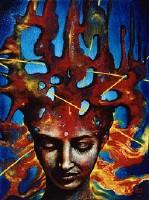 |
| "Tranceformation" |
|
|
|
Musekal Philosophy: The Orphic Synthesis
The
Orphic Essay-with-Soundtrack--a kind of Visionary Recital--mixing the
noetic texts of Philosophy with the poetic texts of Song, broadcasts a
sonorous literary texture and a speculative musical texture--a
radio-text--that is an Orphic medley of the esoteric and the popular;
the high and the low--the sub-textuality of a Soul-text. Remembering
that Philosophy for Plato is a care for soul and begins in
wonder, Re-Vision Radio, in mixing dialectics and song, puts the
logos of scholarship in service to the god Eros. The Orphic
Essay-with-Soundtracks soul-music spans both logos and mythos; both
the critical analysis and the enraptured intuition, both the
down-to-earth investigation and the flight of poetic inspiration; the
fusion of scholarly acumen with poetic reverie; philosophical aptitude
with musical amplitude.
Therefore,
the Musekal PhiloSophy of Re-Vision Radios Orphic
Essay-with-Soundtrack (argument/song) finally leads not to ponderous
academic desiccation but to ecstatic Dionysian celebrationto the
"Joyous Science (of Emerson and Nietzsche). This means it offers a
mood of trance, enchantment, and ecstasy. However, it is not the
brain-dead, new-age elation, but rather, because Mueskal PhiloSophy is
both logos and mythos, what the Orphic Scholar, Emerson, knew as
"Reason in its most exalted mood," which issues in "music that can
deepest reach. Re-Vision Radio, then, carries on the great Platonic
synthesis (between the earlier mytho-mystical, as it was transmitted
through the Greek Mystery Religions, and the newer rationalist
development in Philosophy that had broken away from it: "Intellectual
rigor [read: "the logical"] and Olympian inspiration [read: "the
mytho-poetic"] no longer stood opposed.) of logos and mythos. Because
Platos dialectic became--after it has risen, with an incredible
impulse, through the mania [madness] of Eros to the heights of
philosophy--mantic (poetic-prophetic) vision, Re-Vision Radios Orphic
Essay-with-Soundtrack would energetically channel philosophy back
through the medium of radio, where it rises to the heights of
enraptured song. This Musekal Philosophy, then, is what one sixties
songwriter said the music of that time promised: "A deep ecstasy that
can be had." If the Romantic Movements project of reuniting philosophy
with poetry (reason and imagination, head and heart) meant that the
end of Philosophy is poetry, then Re-Vision Radio would make music the
end of philosophy. |
Musekal Philosophy: Scholarship as Performance Art
Because
everybody knows that Re-Vision Radio broadcasts Musekal PhiloSophy,
Philosophy is recognized as more musical and, conversely, Music is
recognized as more philosophical. Thus, Re-Vision Radio's hermeneutics
discovers the song hidden in the essay and, conversely, the essay
waiting to be written out of the lyric of song. However, Re-Vision
Radio's Orphic Essay-with-Soundtrack, not content to push the
boundaries of academic form by simply inserting popular song lyrics
into the essay as epigraph, would follow the Orphic muse and let the
lyric lusters of snatches from song break out between the lines of
prose--all over the page. Thus, its Orphic Essay-with-Soundtrack is
thoroughly song-haunted--memorable song lyrics fading in and fading out
between the written lines, generating a steady stream of
correspondences between the ideas and the music. In reading between the
lines of dialectics and song, moving back and forth between the prose
and musical text, the Soul-text of the Orphic Essay-with-Soundtrack
relocates the listener in the middle of an ancient philosophical
Quest-Romance:
"Then, as I leaned,
hearkening to that first sound, / Methought a voice sang ... / sweetly
interwound / With music; and its image in my ears / Left such
impression as one often catches / From songs sung to an organ, when one
hears / The words sometimes and sometimes not, by snatches. (Dante, Divine Comedy)
Thus,
Re-Vision Radio's Orphic Essay-with-Soundtrack allows the listener to
not only to "hear" the essay's meaning amplified through song but,
after the song has been run back through the dialectic of the essay, to
"hear" the familiar song in an entirely new way. Was this what that
musical philosopher, Socrates, meant when he declared: "dont we know
that all of this is a prelude to the song itself . . . the song itself
that dialectic performs? And, thus, because Re-Vision Radio practices a
new rado art-form--scholarship as performance art--I would echo this
Socratic question:
Don't you
know that the prose of my Orphic Essay-with-Soundtrack--all of this--is
really a long lead-in to the Song itself, the song that the dialectic
performs?
|
 |
| Visiting Angel-Muse |
|
|
|
|
 |
| Song-haunted Essay-with-Soundtrack |
|
|
|
Musekal Philosophy & the Troubadour's "Joyous Science": Scholarship as Performance Art |
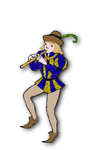 |
| Troubadour |
|
Re-Vision Radios Orphic Essay-with-Soundtrack is both an argument-theory for the reunion of ideas and love, and, at the same time, a song-demonstration of that very reunion. It presents both sides of Platonic argument: dialectics and mythopoiesis, logos and eros; the rational and the mystic, analysis and intuition, intellect and heartan essay in the didactic and erotic modes of the ancient Troubadour school of the Dialectic of Love. The Orphic Essay-with-Soundtrack, fusing love and discourse in flowers of discourse, has Dante or its guide, since the Florentine Troubadour poet desired only to write about the Love that discourses in my mind" [Pugatorio, Canto II]. In the paradise of discourse that is the Orphic Essay-with-Soundtrack, both aspects of the psyche are given their due: reason and imagination, scholarly/critical intellect and intuitive/artistic heart, academic research and mystical insearch; both secular hermeneutics and sacred hermetic/kabbalistic interpretation, both scholarly rigor and poetic reverie, Apollonian clarity and Dionysian obscurity, philosophical questioning and romantic questing.
Re-Vision Radio would broadcast my research and discovery of what happened in the Romantic nineteenth century when Emerson (the "Orphic scholar") and Nietzsche (the musical philosopher of the "Gay Science") invented the "Joyous Science," which I interpret as scholarship finally hearing Wordsworth's complaint of "murders to dissect" (Thanatos) and placing itself instead in the service of Eros--synthesis and celebration. Furthermore, this great discovery connects my intellectual passion for Romanticism with my other all-consuming passion, since it is precisely with the Troubadours of the "12-century Renaissance" that the true origin of the 19th-century Romantic's "Joyous Science"--Gai Saber (literally, "the happy wisdom" or "gay science")--can be found. Moreover, this Orphic Troubadour legacy moves from the Romantic poets into our era with the 1960's folk, folk-rock, and rock musicians.
Plato said of the Muses that "Their song is one that gives joy to the mind.
Wordsworth wanted to make A present joy the matter of a song, and composed his epic The Prelude.
Thus, with this great twin-discovery, which confirmed what I had been doing on radio for a few years anyway--attempting to fuse dialectics & song; ideas & love--, Re-Vision Radio became a university of the airwaves; a "singing school of [the] soul" (Yeats) from the Magdalene Memorial-Musekal Library in the TOWER OF SONG.
|
Therefore, here's the vision that Re-Vision Radio wants to communicate to its listening audience, so they can "see what I mean."
On Re-Vision Radio, when the music that is lurking in the syntax of the essay--the heretofore unheard rhythm of the prose--is amplified through the meme engine of the dialectic, it breaks out in song"one, two, three, four ... But all joy wants eternity,wants deep, deep, deep eternity! (Nietzsche) Suddenly, the lecture hall in the TOWER OF SONG is transformed into the concert hall, and the scholar, instead of merely presenting his thesis discursively, straps on an electric guitar or a bee-bop sax and, as a Professor of Song, sings out his thesis in Visionary Recital. ("That's why I'm telling you in song." V.M.)
[See what I mean below]
|
 |
| Troubadour |
|
|
 |
| Orphic Essay-with-Soundtrack |
|
|
|
Ralph Waldo Emerson, "the American Plotinus" (Neoplatonist), "Orphic Scholar" and rhapsodic lecturer, envisioned a new type of "Man Thinking" (in his 'American Scholar" address); a "Poet as Sayer".
"I am born a poet, of a low class without a doubt yet a poet. That is my nature and vocation. My singing to be sure is very 'husky' and is for the most part in prose. Still I am a poet in the sense of a perceiver & dear lover of the harmonies that are in the soul & in matter, & specially of the correspondence between these & those."
"Ah ye old ghosts! ye builders of dungeons in the air! why do I ever allow you to encroach on me a moment; a moment to win me to your hapless company? In every week there is some hour when I read my commission in every cipher of nature, and I know that I was made for another office, a professor of the Joyous Science, a detector & delineator of occult harmonies & unpublished beauties, a herald of civility, nobility, learning, & wisdom; an affirmer of the One Law, yet as one who should affirm it in music or dancing, a priest of the Soul yet one who would better love to celebrate it through the beauty of health & [the] harmonious power [of music].
|
Nietzsche, most musical of all philosophers, wrote the The Joyous Science and dedicated it, "For My Joyful Sophia." This "troubadour of knowledge" became a wandering scholar--a Gyspy Scholar--and traveled the high mountain villages of the north and the southern Mediterranean). His journeys lead him to the Provence, where he discovered the old Troubadour culture. He said that "love as passion ..." was invented by "the Provencal knight-poets, those magnificent and inventive human beings of the 'gai saber' to whom Europe owes so many things and almost owes itself." The book, The Gay Science, was written in an anti-professorial, anti-academic polemic. Its title suggests "light feet," dancing," and "laughter"--a ridicule of the "spirit of gravity." Besides writing the "Songs" he placed in the appendix of his book, he also composed classical music, which survive to this day. The "Dionysian philosopher" fell into impossible love for muselike Lou Salome and learned as much from that unrequited affair than from all his philosophy books.
"Without music life would be a mistake."
Sing me a new song, the world is transfigured and all the skies rejoice.
"Night has come; only now all the songs of lovers awaken. And my soul, too, is the song of the lover." --'Night Song'
".... I listened with the ear of my Love." --'Brazen Silence'
"[Philosophy] wants ... a Dionysian affirmation of the world as it is, without subtraction, exception, or selection--it wants the eternal circulation:--the same things, the same logic and illogic of entanglements. The highest state a philosopher can attain: to stand in a Dionysian relationship to existence.
I would not know what the spirit of a philosopher might wish more to be than a good dancer.
And we gazed at one another and looked out at the green meadow, over which the cool evening was spreading, and wept together. But then Life was dearer to me than all my Wisdom had ever been.
|
Plato's Phaedrus is the only dialogue set in the lovely countryside, where Socrates and his pupil walk and rest among the meadows and trees. It is a singularly beautiful natural setting, and throughout the dialogue we are not allowed to overlook the influences of nature and of the spirit of inspiration that haunts the spot. The place is consecrated to Achelous and the Nymphs. The dialogue begins with the current discussions among rhetoricians, but then surprisingly abandons them entirely as the preferred mode of dialectics, only to return to them in a completely transformed attitude, after it has risen [the dialectic], with an incredible impulse, through the mania [madness] of Eros to the heights of philosophy.
In other words, Socrates gradually falls under its inspiration and his strict rhetoric gradually flows over into lyrical eloquence, astonishing his companion. Plato shows us the Dionysian side of the master dialectician, one that transforms him out his sober argumentation. Socrates soon is so possessed by divine inspiration or madness (of the Nymphs and the Muses) that he must break off his rapt speech before it threatens put him entirely out of his senses. Thus, the Socrates of the Phaedrus reveals himself to be, in his full ripeness, the inspired philosopher-dialectician; no, Socrates the Dionysian musician! since the dialogue closes with a hymn to the god Pan. So Socrates ("the enchanter"), the philosopher whose death is now imminent, is depicted as possessed of enraptured incantation of the poet-musician, offering up hymns to gods of the irrational side of life. The transformation effected in the Phaedrus had already been heralded in the Phaedo through Socrates dream of making music. Divine madness (mania), a gift from heaven, had taken possession of the soul of Socrates and transfigured him out of his ordinary, sumpremely sober, character. So heres the philosophical question that challenges academic philosophy establishment: What does it mean, then, that the father of Philosophy and the exemplar of dialectical inquiry ends his life composing musical hymns to the gods Apollo, Eros, and Pan? |
To reiterate: in the Tower of Song, the Orphic Scholar's
address becomes more and more inspired and rhapsodic ("Reason in its
most exalted mood"), until the Dionysian energy can no longer be
controlled:
"... one, two, three, four ... But all joy wants eternity,wants deep, deep, deep eternity!" (Nietzsche)
|
Suddenly, the Lecture Hall in the TOWER OF SONG is transformed into the Concert Hall, and the performing scholar (The Orphic Scholar), instead of merely presenting his thesis discursively, straps on an electric guitar or a bebop sax and, as a Professor of Song, sings out his thesis ("philosophy in a new key") in song.
Thats why I'm telling you in song.
(Van Morrison)
|
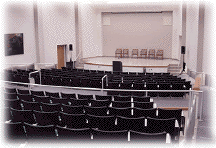 |
| Lecture Hall |
|
|
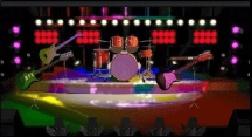 |
| Concert Hall |
|
|
| Little Village | Little village baby, ain't large enough to be a town
From a little village baby, ain't large enough to be a town
Gotta get away from the city
It's gonna bring you down
Heard the voice of the silence, in the evening
In the long cool summer nights
Heard the voice of the silence, in the evening
In the long cool summer nights
Telling me not to worry
Everything's gonna be all right
There's only two kinds of truth
Baby let's get it straight from the start
There's only two kinds of truth
Let's get it straight from the start
It's what you believe
Baby in your head and your heart
Heard the bells ringing
Voices singing soft and low
Heard the bells ringing
Voices are singing soft and low
Way up in the mountain, little village in the snow
Raining in the forest
Just enough to magnetise the leaves
Raining in the forest
Just enough to magnetise the leaves
We’ll go walking baby with the moonlight shining down through the trees
Little village, way up on the mountainside
Little village baby, way up on the mountainside
Way across the ocean with you by my side
--Van Morrison, 'LittleVillage' |
 |
| "the Troubadours coming through town." |
|
|
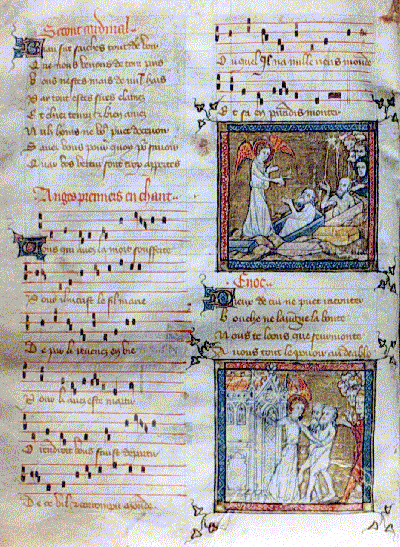 |
| Angelic Music |
|
|
 |
| click to go to next page |
|
|
|